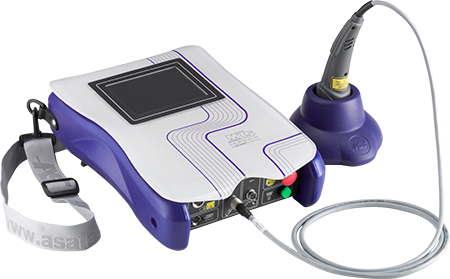MLS Laser
What is the difference between LLLT and MLS Therapy?
The main difference between Low-Level Laser Therapy (LLLT) and Multiwave Locked System (MLS) Laser Therapy lies in their approach to treatment. LLLT typically uses a single wavelength and is limited to surface biostimulation, requiring many treatment sessions and long treatment times. It is seldom an effective stand-alone treatment. On the other hand, MLS Laser Therapy uses multiple synchronized wavelengths to deliver simultaneous anti-inflammatory, anti-edema, and analgesic effects, offering both immediate and long-lasting relief from painful conditions. This makes it an effective treatment for various medical and dental conditions, including pain relief, inflammation reduction, and accelerated recovery.
The MLS Laser Therapy is considered an ideal non-invasive, pain-free, and safe treatment modality that complements and benefits many dental procedures.

How does MLS Therapy work?
The MLS Laser Therapy works by using light to trigger a specific biological reaction on a cellular level, similar to how plants get energy from the sun through photosynthesis. This process causes cells to begin healing from the inside out by increasing blood flow, promoting tissue repair and remodeling, stimulating the immune system, improving lymphatic drainage and reducing swelling, and enhancing the body’s natural healing process. The therapy utilizes two wavelengths to overcome the limits of traditional Laser Therapy, delivering both wavelengths in a reinforcing and synchronized manner, which results in simultaneous anti-inflammatory, anti-edema, and analgesic effects, providing immediate and long-lasting relief from painful conditions. MLS Laser Therapy is a non-invasive, safe, and effective treatment modality that utilizes light to relieve pain, reduce inflammation, and promote wound healing and soft tissue repair.
Is MLS Therapy safe for everyone?
MLS Laser Therapy is generally considered safe for the majority of patients. However, there are certain conditions in which it should not be used, such as active infections, bleeding disorders, or cancerous tumors. Patients with hypersensitivity may also experience an allergic response to the laser radiation. It is important for individuals with pre-existing health concerns to discuss them with a healthcare provider before undergoing MLS Laser Therapy to ensure they are appropriate candidates for the procedure. Additionally, the therapy is not recommended for individuals with certain medical conditions, and a careful evaluation should be conducted to determine if it is the right treatment.
